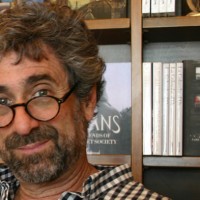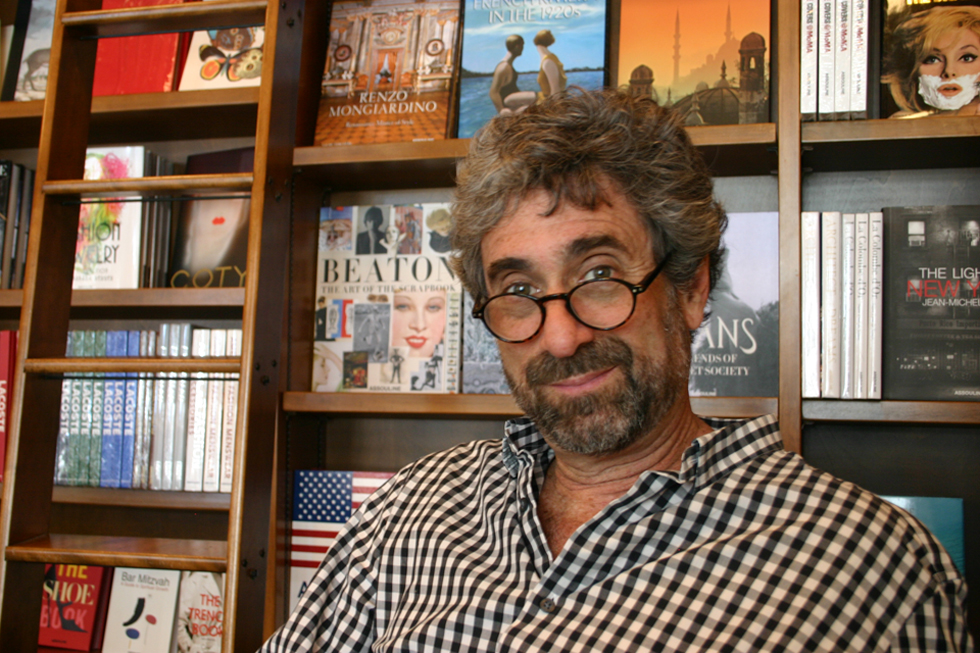Celebrating the Miami Book Fair: A Conversation with Mitchell Kaplan

The Miami Book Fair (MBF) is the largest book fair in the United States. In 2014, MBFI celebrated its thirtieth anniversary and presented over six hundred writers to hundreds of thousands of readers. Held every November at Miami-Dade College in the heart of downtown Miami, MBFI is an eight-day literary party that has consistently attracted the participation of the world’s major literary figures.
The book fair was cofounded by Mitchell Kaplan, the owner/founder of Books & Books, and Eduardo J. Padrón, the president of Miami-Dade College (MDC). Books & Books has become one of the premier independent bookstore groups in the United States and Mitch is a highly respected leader of his industry. MDC has grown to become the largest institution for higher education in Florida and the second largest in the United States.
I had the opportunity to sit down with Mitch Kaplan at his flagship bookstore in Coral Gables and discuss the odyssey that has produced one of the best bookstores of my experience, and the largest book fair in the United States.
Raymond Elman: How long have you lived in the Miami area?
Mitch Kaplan: I was born in Miami and I grew up in Miami Beach—I have lived here for virtually my whole life. However, I went away to college at the University of Colorado in Boulder, where I was an English major—me and about eight or nine thousand others were English majors, and there were only about two hundred business majors. It was a very different world back then. And Boulder was a perfect place for me as a kid from Miami Beach who had never seen mountains or snow.
When I graduated, like a lot of English majors in the 1970s, I panicked and went to law school—a law school called Antioch, in Washington, DC, that focused on social change. For example, in my first year I was in prisons working on prisoners’ rights. But, after a couple of years, I knew that law just wasn’t for me.
RE: When did you first start thinking about opening a bookstore?
MK: I grew up with some great bookstores on Miami Beach. For example, there was a great Doubleday bookstore on Lincoln Road. Authors were my heroes and, being an English major, I learned about many of the great bookstores in literary history, such as Shakespeare and Company, the Gotham Book Mart, and City Lights, and what they meant to their communities. So I got an advanced degree in English and returned to Miami to teach English and work at a B. Dalton bookstore to learn the business. And then I opened a bookstore in Coral Gables and taught at the same time. I told myself that if I earned as much from bookselling as I earned from teaching, I would devote myself to bookselling. Fortunately, I was earning so little as a teacher that it wasn’t hard to achieve that goal. I did that in 1982, and that’s when I started selling books full time.
RE: Where did the name Books & Books come from?
MK: I was thinking of all sorts of names—like “Bent Tree Bookstore”—and then I was in a café, and I was telling a waitress about my plan, and she asked, “Well, what are you going to carry?” And I said, “We’re just going to carry books and books.” And I thought, “Eureka!”
RE: So what happened when you opened for business? I can’t imagine that the world was beating a path to your door.
MK: Well, they were. You’ve got to remember that the world in those days was different. In 1982, fifty percent of books sold were sold in independent bookstores. There were seven or eight independent bookstores in the Miami area. And my bookstore was beautiful—much like it is now—with floor to ceiling books.
RE: How did you develop the “look” of Books & Books?
MK: I always felt that bookstores should be the ultimate in browsing, with floor to ceiling books and library ladders. But, as we built other stores, I felt that they shouldn’t be “cookie-cutter.” You could have a little hole-in-the-wall bookstore that looks like a bodega, and it could be fantastic. It just has to be right for its audience. It’s about making a place that really feels comfortable.
RE: So you started Books & Books in 1982, and you cofounded the Miami Book Fair in 1984. That’s a pretty big leap. How did you have the gravitas to start a book fair?
MK: Well, I did something even quicker. In 1983, I started something called “The Coral Gables Festival of Books & Writers,” which was a mini book fair. I had been to book fairs in New York and Boston, and I always wanted to have a festival in Miami, as well as open bookstores.
Dr. Eduardo Padrón had been to a book festival in Barcelona, and his brief, as president of the downtown campus of Miami-Dade College, was to bring interest to downtown Miami. When he got wind of my festival in Coral Gables, and some other activities around the Miami area, he called us all together at his office and suggested that we consolidate everything and organize a bigger fair on Miami-Dade’s downtown campus.
Starting the Miami Book Fair wasn’t a question of gravitas or hubris—I knew what people were buying in the Miami area. From the moment we opened our doors at Books & Books, we were selling pretty sophisticated stuff.
RE: As I have been developing this arts publication platform for Miami, I sometimes hear people say that what I want to do with the publication is too intellectual, too sophisticated for Miami.
MK: I’m on the front lines and I reject that characterization. Miami is as sophisticated as any other city. But keep in mind that Miami only has 2.5 million people, and English is no longer the first language of Miami. But the sophistication levels here are really, really high. I know what other independent booksellers sell around the country, and nobody has us beat in terms of the sophistication of the books we sell. We have a Spanish book buyer, sell lots of books in Spanish, and have Spanish events. We revel in the diversity of Miami.
RE: How large was the first Miami Book Fair?
MK: The first book fair lasted for two days, we had seventy authors, and it was a smashing success. We started with the same format we have now—a street fair for publishers and talks by authors. We had James Baldwin talk the first year. We had Marge Piercy from Cape Cod. And people came.
RE: I lived on the tip of Cape Cod for a long time. Who are some of the other Outer Cape Cod authors who have spoken at the book fair or at Books & Books?
MK: Well, let’s start with Hilary Masters. He came to Books & Books right after we opened and read from Last Stands: Notes from Memory, which is a marvelous book about him and his father, Edgar Lee Masters. Hilary was a really engaging speaker, and he was very open about his relationship with his father, who was a great poet. I felt like I was in the presence of a deeply literate sensibility. I tend to honor those kinds of memories. I have been a conduit for thirty years for writers who were important in the latter part of the twentieth century to a whole new collection of writers now. The memories I have of those folks, many of whom are no longer being read, are important to keep alive.
One of our very first autograph sessions at Books & Books was with Isaac Bashevis Singer, which was an amazing experience. I had the opportunity to visit with him at his apartment in Surfside, Florida, and he told me all sorts of stories. In the 1980s, Norman Mailer was here for Ancient Evenings, and he couldn’t have been nicer or more generous with his time. He was feisty and articulate. He was in full force. Also around that time we had writers like Ken Kesey, John Updike, Maya Angelou, Jerzy Kosinski, Saul Bellow, Joseph Heller.
Of contemporary authors who presented at the book fair or at Books & Books, Alec Wilkinson has such a wide sensibility. Not only is he an amazing narrative journalist, but in his book on William Maxwell, and his New Yorker piece on Edward Hirsch, he demonstrates a true literary sensibility, which I respond to very well. John Waters has been at the fair many times and presented at the fair in 2014. He’s so funny and outrageous but he has a sense of humanity that shines through.
Michael Cunningham has come to the fair for most of his books. Michael has an audience in Miami; he’s a great reader and has a great presence on stage. I think he really enjoys himself in South Florida.
Sebastian Junger has been here a number of times—and boy, watching his career develop has been amazing, from being a basic narrative journalist to becoming part of the news himself. He’s become a commentator on things he understands deeply.
Dan Okrent is another fantastic guy and author who has presented at the bookstore and the fair. Dan’s audiences at the fair have been very appreciative. He has a readership here in South Florida, and it’s not just because he was with the New York Times. His books strike a nerve. The last time he was here was for Last Call, his book on Prohibition, and we went out to dinner. With some of the authors we have time to go out for dinner. I call it my five minutes with a million different writers—it’s an enriching experience.
When I look back on the era when I started the Miami Book Fair, it was a time before the Internet, before computers. A time that just doesn’t exist anymore. What I do isn’t just about selling books—it’s about creating spaces and events that bring authors and audiences together. I call it “honoring the literary culture.” ♦



